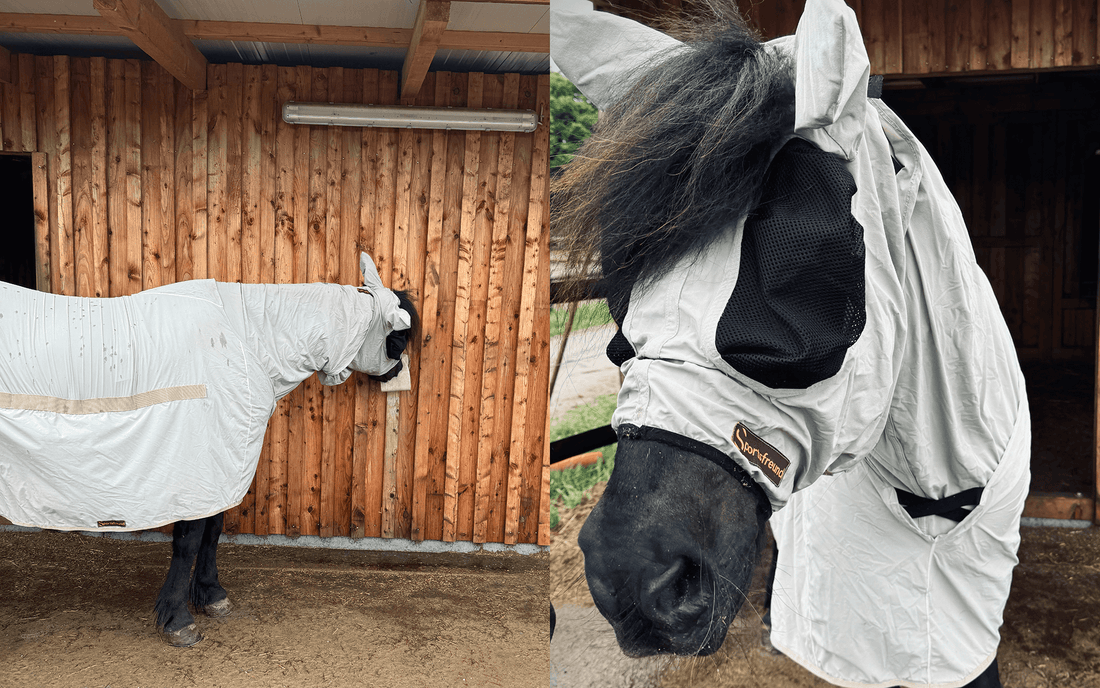Summer Eczema: An Overview
Summer eczema is an allergic skin disease caused by the bite of the female black fly. The reaction to the proteins in the mosquito's saliva leads to severe itching, inflammation and skin changes.
In recent years, an increasing number of cases of summer eczema have been recorded, particularly in overweight large horse breeds such as Friesians and Haflingers.
It is clear that skin problems in horses of all breeds have increased considerably in recent years.
Causes and Favoring Factors
In addition to the mosquito bite, various other factors play a role in the development of summer eczema:
- Genetic predisposition
- Weakened immune system
- food
- environmental conditions e.g. over-fertilized pastures
- overweight
- stress
THINGS WE CAN CHANGE : STRENGTHEN THE IMMUNE SYSTEM. This is the key to prevention
A strong immune system is crucial to prevent allergies and skin diseases. Supportive measures include:
Mineral feed: Supplementation of zinc and vitamins (C, E, B) that strengthen the skin and the immune system.
Liver detoxification: Zeolite binds toxins in the body and relieves the liver. A burdened liver can have a negative effect on the skin.
Studies show that horses with a weakened immune system are particularly susceptible to allergies and skin diseases.
GAME CHANGER
Insect protection through:
eczema blankets
offer protection against mosquito bites and, according to Schaffartzik et al. (2012), reduce symptoms by up to 80%, especially in the first 3 years after import.
Fly sprays have a supportive effect
Stable hygiene : insect nets/slats and the removal of standing water prevent mosquito breeding grounds
other factors:
stress reduction
Imported horses should be given time to get used to the new environment before they are stressed. Stress is a trigger for immune deficiency and therefore a risk factor.
pastoral farming
Avoid over-fertilized meadows, as grass that contains too much sugar promotes inflammatory processes.
Studies recommend that robust horse breeds should graze on pastures with structurally rich, knee-high grass for a maximum of 3 hours in order to limit the intake of proteins/fructans (sugars), which are associated with summer eczema.
feeding and nutrition
A healthy diet plays a key role in the prevention and treatment of summer eczema.
Omega-3 fatty acids (e.g. from linseed or fish oil) have anti-inflammatory effects and promote skin health.
Zinc and vitamins E, B and C are essential for skin function and should be fed in sufficient quantities.
Avoiding sugar and starch : Horses with sweet itch benefit from a diet that avoids sugar and starch-containing feeds to minimize inflammatory processes. A 2020 study showed that excessive nitrogen in pasture grass can exacerbate the risk of allergy in Icelandic horses with sweet itch.
Conclusion:
Sweet itch is a complex disease that is caused by genetic predisposition, environmental factors and a weakened immune system. However, with the right prevention and care, the risk can be significantly reduced. A strong focus on strengthening the immune system, a healthy diet and effective insect protection are essential.
By combining these measures, horse owners can help their animals to avoid or alleviate summer eczema in the long term.
THE BETTER WE TAKE CARE OF A HORSE, THE BETTER IT WILL DO. THAT'S WHY WE SUPPORT THE THEORY OF INSIDE AND OUTSIDE CARE FOR SUMMER ECZEMA AND CO.
This is just scratching the surface. I will be writing more information on the subject of sweet itch over the next few months. STAY TUNED

